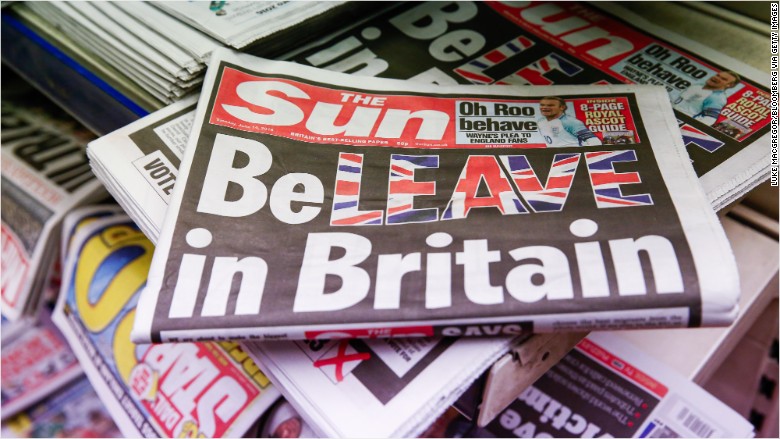
Investors around the world are starting to sweat about next week's U.K. referendum on the European Union.
New opinion polls show the U.K. public could vote next week to leave the EU - the so-called Brexit option. Top selling British newspaper The Sun on Tuesday urged its readers to back Brexit.
The polls may not be a reliable guide to the result but traders sense that support is growing for Brexit, and they're responding by selling stocks and the pound. The FTSE 100 is down 5% in June, and the pound has lost four cents against the U.S. dollar over the same period.
Uncertainty about the outcome, and the impact on the economy, is making currency markets particularly nervous. The pound is much more volatile than even during the 2008-2009 financial crisis, according to Holger Schmieding, chief economist at Berenberg bank.

Investors are pouring money into relatively safe investments instead. The yield on Germany's 10-year government debt, which moves in the opposite direction to bond prices, sank into negative territory for the first time ever on Tuesday. Buyers of these bonds are essentially taking a loss just to hold these assets.
"The phrase 'sea of red' has never seemed more appropriate [to describe markets]," said Chris Beauchamp, a senior market analyst at online trading firm IG.
The referendum on June 23 is the biggest political decision Brits have faced in a generation.
Those in favor of leaving the EU say European regulations stifle U.K. businesses and leaving would boost the economy. They also say Britain would regain control of its borders and be able to limit immigration.
Those campaigning for the U.K. to stay -- including the government -- paint a much grimmer picture of life outside the EU. They say trade and investment would suffer, triggering a recession, killing jobs, slamming the pound and causing house prices to fall.
"Volatility in markets reflects the problem of pricing in two completely opposing economic outcomes," said Paul Donovan, a senior economist at UBS (UBS).
Related: What happens if there's a Brexit?
Opinion polls themselves have been volatile throughout the campaign, and have a poor track record recently -- they got last year's general election result wrong.
But "Brexiteers" seem to have gained ground in recent days. Six new opinion polls have shown, on average, that 51% of voters will opt to leave the EU.
The Sun, read by millions, made a passionate case for leaving the EU on its front page Tuesday.
"Outside the EU we can become richer, safer and free at long last to forge our own destiny — as America, Canada, Australia, New Zealand and many other great democracies already do," the paper said.
The immediate fallout, however, could result in market turmoil as people try to figure out the consequences of the U.K. leaving the world's largest single market.
The Bank of England allocated an extra £2.5 billion in cash to banks on Tuesday. It will hold two more exceptional auctions of cash on either side of the vote to help banks keep the financial system moving.
Related: Brexit could trigger European stock market crash
If you're the gambling type, betting odds still indicate Britain will vote to remain, but the chances of a Brexit are rising.
"According to bookmakers, the probability of a Brexit has risen to 42% today from 20% on May 26," noted Berenberg's Schmieding.


